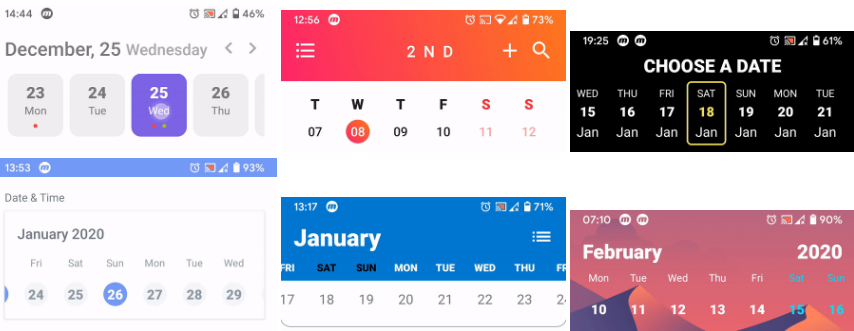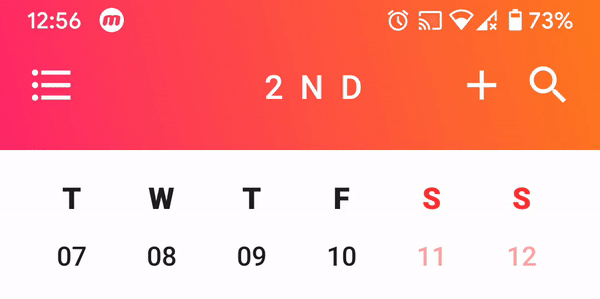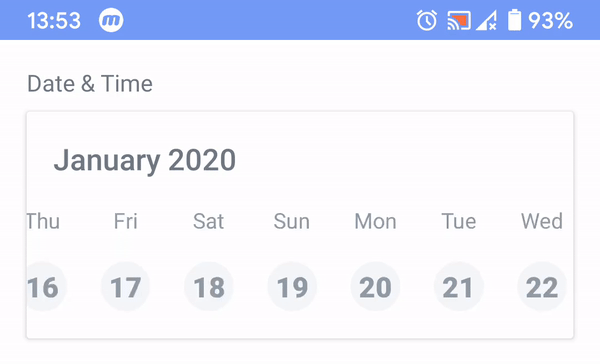Android library for horizontal single row calendar

SingleRowCalendar
With this library, you aren't attached to library built-in UI. You can create really beautiful and customizable UI and use selection features without hands getting dirty with RecyclerView and SelectionTracker.





FEATURES
- single selection
- multiple selection
- enable/disable long press to start selection
- enable/disable deselection
- set count of dates in past or future, or you can provide your dates
- initial position
- easily observe for changes in selection
- control selection of particular items using selection manager
- programmatically deselect and select items
- check if the item is selected
- set selection
- clear selection
- and more...
INSTALLATION
GRADLE
dependencies {
implementation 'com.michalsvec:single-row-calednar:1.0.0'
}
MAVEN
<dependency>
<groupId>com.michalsvec</groupId>
<artifactId>single-row-calednar</artifactId>
<version>1.0.0</version>
<type>pom</type>
</dependency>
USAGE
1. create calendar item view layout files
- create layout files, which will be defining how you calendar will look like
- basic item - selected and deselected
2. create special calendar item view layout files (optional)
- if you need some special items, which will be displayed accroding to your logic you can add them
- special item - selected and deselected
3. add SingleRowCalendar to your activty or fragment layout file
<com.michalsvec.singlerowcalendar.calendar.SingleRowCalendar
android:id="@+id/main_single_row_calendar"
android:layout_width="match_parent"
android:layout_height="wrap_content"
android:layout_marginStart="16dp"
android:layout_marginTop="16dp"
android:layout_marginEnd="16dp"
app:deselection="false"
app:longPress="false"
app:multiSelection="false" />
4. setup CalendarViewManager
val myCalendarViewManager = object : CalendarViewManager {
override fun setCalendarViewResourceId(
position: Int,
date: Date,
isSelected: Boolean
): Int {
// return item layout files, which you have created
}
override fun bindDataToCalendarView(
holder: SingleRowCalendarAdapter.CalendarViewHolder,
date: Date,
position: Int,
isSelected: Boolean
) {
// bind data to calendar item views
}
}
5. setup CalendarSelectionManager
val mySelectionManager = object : CalendarSelectionManager {
override fun canBeItemSelected(position: Int, date: Date): Boolean {
// return true if item can be selected
}
}
6. setup CalendarChangesObserver
val myCalendarChangesObserver = object : CalendarChangesObserver {
override fun whenWeekMonthYearChanged(weekNumber: String,monthNumber: String,monthName: String,year: String,date: Date) {
super.whenWeekMonthYearChanged(weekNumber, monthNumber, monthName, year, date)
}
override fun whenSelectionChanged(isSelected: Boolean, position: Int, date: Date) {
super.whenSelectionChanged(isSelected, position, date)
}
override fun whenCalendarScrolled(dx: Int, dy: Int) {
super.whenCalendarScrolled(dx, dy)
}
override fun whenSelectionRestored() {
super.whenSelectionRestored()
}
override fun whenSelectionRefreshed() {
super.whenSelectionRefreshed()
}
}
7. provide dates and init SingleRowCalendar in your code
You can choose between two ways of doing it. If you want simple provide few past of future days, you should specify these attributes pastDaysCount, futureDaysCount and includeCurrentDate in an XML or directly in code.
If you are not satisfied with the previous solution you can specify your own list of dates using setDates function.
When you provide dates to the calendar you can also set you initial position using this property initialPositionIndex.
val singleRowCalendar = main_single_row_calendar.apply {
calendarViewManager = myCalendarViewManager
calendarChangesObserver = myCalendarChangesObserver
calendarSelectionManager = mySelectionManager
futureDaysCount = 30
includeCurrentDate = true
init()
}
PARAMETERS AND FUNCTIONS
pastDaysCount- number of days in past displayed in the calendar
futureDaysCount- number of days in future displayed in the calendar
includeCurrentDate- include current date in the calendar
initialPositionIndex- first displayed item in the calendar
multiSelection- enable or disable multi selection
deselection- enable or disable deselection
longPress- first selected item starts with a long press
calendarChangesObserver- using this callback we can observe for changes in the calendar
calendarViewManager- this callback is responsible for inflating item views to calendar
calendarSelectionManager- using this callback we can enable or disable selection for particular items
setDates(newDateList: List<Date>)- when you don't want to use
pastDaysCountandfutureDaysCountyou can specify your list of dates
- when you don't want to use
getDates()- returns used dates in the calendar
getSelectedIndexes()- returns list of selected postions
getSelectedDates()- returns list of selected dates
onSaveInstanceState(state: Bundle)- preserves selection
onRestoreInstanceState(state: Bundle)- restores selection from previously saved state
hasSelection()- returns true if calednar has any item selected
isSelected(position: Int)- check if particular item is selected
deselect(position: Int)- attempts to deselect an item
select(position: Int)- attempts to select an item
setItemsSelected(positionList: List<Int>, selected: Boolean)
* you can select or deselect multiple items at onceclearSelection()- deselect all items in the calendar
DateUtils class
You can use DateUtils class when you want get some values from date.
getDayName(date: Date)- returns day name, for example Friday, Thursday, Monday, etc...
getDay3LettersName(date: Date)- returns day abbreviation, for example Fri, Thu, Mon, etc...
getDay1LetterName(date: Date)- returns day abbreviation, for example F, T, M, S, etc...
getMonthNumber(date: Date)- returns month number, for example 1, 3, 12, 9, etc...
getMonthName(date: Date)- returns month name, for example December, September, January, etc...
getMonth3LettersName(date: Date)- returns month abbreviation, for example Jan, Feb, Dec, etc...
getYear(date: Date)- returns year, for example 2010, 2019, 2020, 2034...
getDayNumber(date: Date)- returns number of day in a month, for example 15, 16, 17, etc...
getNumberOfWeek(date: Date)- returns number of week in a year, for example 1, 5, 22, 50 etc...
getFutureDates(count: Int)- returns a list of future dates with specified length
getPastDates(count: Int)- returns a list of past dates with specified length
getDates(pastDays: Int, futureDays: Int, includeCurrentDate: Boolean)- returns a list of dates with specified parameters